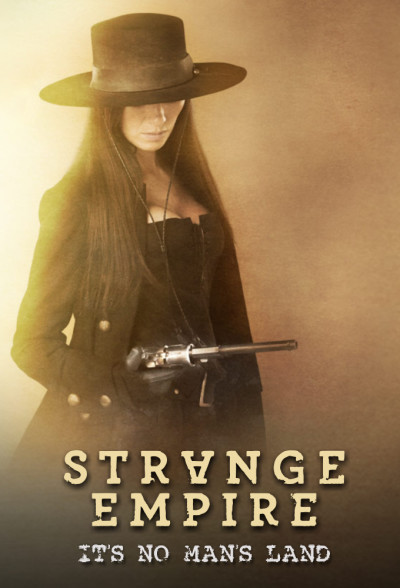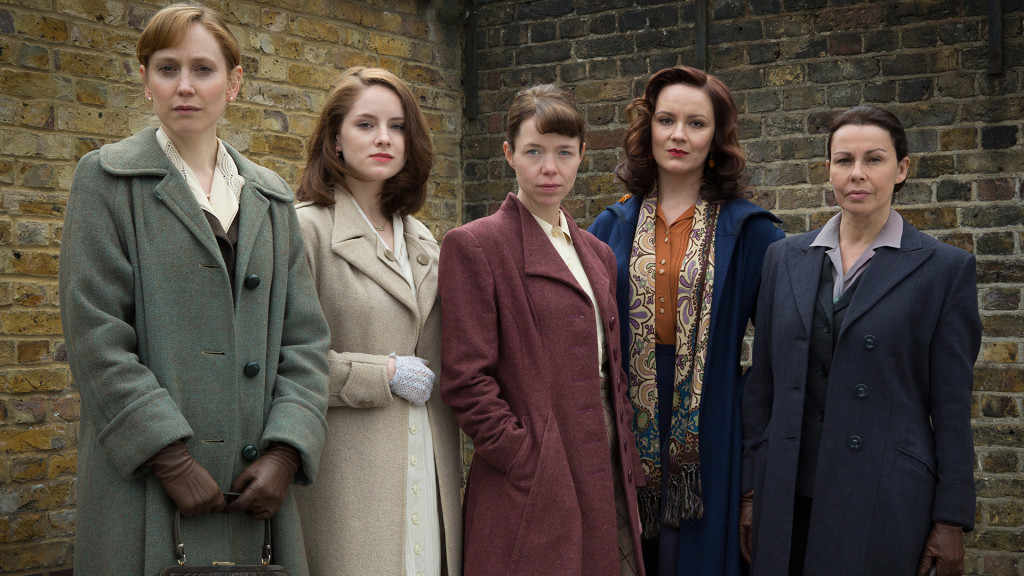 The recent arrival of a large batch of telenovelas on Netflix has opened the window on a new field of potential action heroines. For these Latin American TV series – often (and, admittedly, not entirely incorrectly) derided as soap operas – appear to be featuring an increasing number of strong heroines. Before we get to the reasons for that, let’s have an overview of the field in general. They began in the 1950’s, springing up almost simultaneously out of Brazil, Cuba and Mexico, but there is now hardly a Spanish-speaking country that doesn’t produce them – indeed, the style has also been adopted by non-Hispanic countries, such as Korea. That format differs from soap-opera in that it is less open-ended: rather than an indeterminate run, it is a single story, told in concentrated form, typically daily, or at least multiple episodes per week.
The recent arrival of a large batch of telenovelas on Netflix has opened the window on a new field of potential action heroines. For these Latin American TV series – often (and, admittedly, not entirely incorrectly) derided as soap operas – appear to be featuring an increasing number of strong heroines. Before we get to the reasons for that, let’s have an overview of the field in general. They began in the 1950’s, springing up almost simultaneously out of Brazil, Cuba and Mexico, but there is now hardly a Spanish-speaking country that doesn’t produce them – indeed, the style has also been adopted by non-Hispanic countries, such as Korea. That format differs from soap-opera in that it is less open-ended: rather than an indeterminate run, it is a single story, told in concentrated form, typically daily, or at least multiple episodes per week.
While associated with romantic entanglements, class divides, family drama. terminal illness, pregnancies and extreme over-acting, that is not quite accurate. Yes, there are plenty which feature that kind of thing – the four R’s of the genre being romance, rivalry, revenge and redemption – and even the top-end are still budget productions by the standards of English language television, costing at most $170,000 per 45-minute episode, a fraction of the $1 million per episode spent in Hollywood on even the cheapest of scripted dramas. But an increasing number have become more interesting and gritty, exploring darker themes. There’s even a telenovela version, also available on Netflix, of Breaking Bad, called Metástasis, which is basically identical to the original, right down to a hero called “Walter Blanco”.
In particular, the landscape changed with the unprecedented success of La Reina del Sur in 2011. During its American screenings, even though it was on a purely Spanish-language station, Telemundo, it was often the most-watched program in the coveted age 18-49 demographic, beating the English-language channels. Its finale scored the highest-ever ratings in Telemundo’s history, and was seen by about the same number of people as watched the last episode of, say, Parks and Recreation. [An English language remake, Queen of the South, starring Sonia Braga, will appear on the USA Network later this year] It was the station’s most expensive production, but it’s the story – a woman who rose from nothing to become the biggest drug boss in southern Spain – which matters here.
 For the new ground it broke, in its depiction of a heroine who could be as tough and ruthless as any man, clearly resonated with the audience. Inevitably, the show spawned a slew of others seeking to imitate its success, with similarly single-minded and ambitious heroines, prepared to gun down anyone who wrongs them, or gets in their way. And it’s this new generation of telenovelas, that we find showing up on Netflix in bulk. But where to start? That’s what this article is for: I’ve watched the series of potential interest to gauge whether they deliver on the potential offered by their covers. Though I give you a caveat. These shows typically run anywhere up to 80 episodes, and watching that would be about three months of the viewing time I devote to this site. So, I’ve based what follows, mostly on the first 10 episodes of each. Full reviews will follow eventually.
For the new ground it broke, in its depiction of a heroine who could be as tough and ruthless as any man, clearly resonated with the audience. Inevitably, the show spawned a slew of others seeking to imitate its success, with similarly single-minded and ambitious heroines, prepared to gun down anyone who wrongs them, or gets in their way. And it’s this new generation of telenovelas, that we find showing up on Netflix in bulk. But where to start? That’s what this article is for: I’ve watched the series of potential interest to gauge whether they deliver on the potential offered by their covers. Though I give you a caveat. These shows typically run anywhere up to 80 episodes, and watching that would be about three months of the viewing time I devote to this site. So, I’ve based what follows, mostly on the first 10 episodes of each. Full reviews will follow eventually.
Before I break them down. there are some common elements in these shows, worth addressing to avoid having to repeat myself!
- The glamorization of criminality. The heroines here are generally not cops, private eyes or other characters on the side of law and order. They are almost all criminals; some begin as criminals (or their other halves), some become criminals, and others have criminality forced upon them. But the escape from whatever perils befall them inevitably involves illegal activities of one kind or another.
- Flashbacks R Us. In most of these, we join proceedings at a particularly dramatic moment, and then skip back to see what brought us to that point. This isn’t unheard of in American TV of course – the “24 hours previously” trope – but in telenovelas, this can last for multiple episodes. Indeed, in at least one case, I get the feeling the entire series may be a flashback.
- Sexual assault as a plot-device. Unfortunate, this one, and also symptomatic of lazy writing, in that the creators can’t seem to think of many other ways to trigger the heroines into action. Want her to move out? Sleazy stepfather tries it on. Need her to get her hands bloody? Rape and revenge! Then again, it kinda makes sense, since they seem to take place in a universe where all men appear to be scumbags with exactly one thing on their minds…
- Recommended for viewing at about 75% attention. If I actually sit down and watch these, their flaws (such as fairly obviously being shot on video) tend to become a bit too glaring. I’ve found that they’re more palatable watched while doing something else, lightly-engaging – in my case, the daily stint on the treadmill.
Camelia la Texana
 If perhaps the least “action heroine-y” of the shows taste-tested here, there’s a fair case to be argued for the storyline being the most interesting, overall. The show was inspired by Contrabando y Traición (Smuggling and Betrayal), one of the first “narcocorrido” songs from legendary norteño band, Los Tigres Del Norte. It tells of Emilio and Camelia who smuggle drugs into America, only for him to dump her. Camelia does not respond well: she shoots him seven times and vanishes with the money. It led to a movie of the same name, and has since become embedded in popular Hispanic culture, even becoming an opera in 2013, with Camelia becoming a mythical figure, whether or not she ever was based on a real person.
If perhaps the least “action heroine-y” of the shows taste-tested here, there’s a fair case to be argued for the storyline being the most interesting, overall. The show was inspired by Contrabando y Traición (Smuggling and Betrayal), one of the first “narcocorrido” songs from legendary norteño band, Los Tigres Del Norte. It tells of Emilio and Camelia who smuggle drugs into America, only for him to dump her. Camelia does not respond well: she shoots him seven times and vanishes with the money. It led to a movie of the same name, and has since become embedded in popular Hispanic culture, even becoming an opera in 2013, with Camelia becoming a mythical figure, whether or not she ever was based on a real person.
A three-minute song doesn’t have enough meat for a 60-episode series, so of necessity the show expands the scope significantly. With occasional flashbacks to events during the forties, it mostly takes place in the early seventies, when Camelia (Sara Maldonado) is training to be a dentist in Texas, working part-time at a diner, and waiting for her boyfriend to return from the Vietnam War. In short order, pretty much all of that falls apart, and she is instead thrown together with a well-groomed gangster called Emilio Varela (Erik Hayser), who has been tasked with bringing Camelia back to Mexico, where a drug lord has an inexplicable – well, it’s pretty explicable, actually – interest in her.
If Camelia has not, in the early going, done much to justify the viewer’s interest [thus far, she has mostly been making gooey eyes at her beau], the rest of the show is quite intriguing. There’s a power struggle south of the border between rival gangs, and it’s the women there who hold much of the power, albeit from the shadows. There’s even an occult subplot, involving a blind young girl who can foresee the future – as well as a transvestite shaman who cannot, despite her claims! Add in a good deal of political chess, and there has been enough to sustain interest, while we twiddle our thumbs, waiting – if the series is true to the song – for Camelia to pop the requisite seven bullets into Emilio and, one hopes, head into business on her own terms.
Dueños del paraíso
 After the success of La Reina Del Sur, its star, Kate Del Castillo, went back to the narconovela well for this series, which takes place in Miami during the seventies. At this point, marijuana was the main drug of choice, but cocaine was on the rise, and the resulting battles for turf in Florida were bloody. The Cubans, Mexicans and Colombians fought each other, and among themselves, for control of the lucrative market. Arriving in Miami is the recently widowed Anastasia Cardona (Del Castillo), whose late husband was a major player in Mexico, with aspirations to become one of the “Owners of paradise”, as the title translates, in the American market.
After the success of La Reina Del Sur, its star, Kate Del Castillo, went back to the narconovela well for this series, which takes place in Miami during the seventies. At this point, marijuana was the main drug of choice, but cocaine was on the rise, and the resulting battles for turf in Florida were bloody. The Cubans, Mexicans and Colombians fought each other, and among themselves, for control of the lucrative market. Arriving in Miami is the recently widowed Anastasia Cardona (Del Castillo), whose late husband was a major player in Mexico, with aspirations to become one of the “Owners of paradise”, as the title translates, in the American market.
His rival, Leandro Quezada, believes one of his minions killed Señor Cardona. But it was actually Anastasia who did it, fed up with her spouse’s lies and womanizing, which culminated in getting his mistress pregnant. Not that this stopped Quezada from storming the funeral and stealing the body, in revenge for a previous insult. This leads to Anastasia being kidnapped and nearly killed, spending seven months in hospital recovering. She has a small but loyal band of employees, who are working to build up the business, and have issues of their own to deal with. But Quezada and others are less than happy at the prospect of anyone – least of all a woman – carving a slice out of the territory.
There’s potential here, and Del Castillo is always worth watching. It is, however, taking its own time about getting there, frequently diverting off into largely interesting subplots. For example, the wife of one of her employees is trying to start a career as an actress (largely behind her husband’s back), and gets signed as the lead in a film called Sugar Lips. No prizes for guessing where that thread is going, though with the Weinstein affair rumbling on at the point of this update, it’s coincidentally timely. It’s also not clear quite what Quezada was doing during the more than half a year after he dumped Anastasia into an alligator-infested swamp. He should have been looking to take out the rest of her operation, I’d have thought: here, he seems content to sit by the pool or whatever.
At time of writing, I’m about one-third of the way through the 71 episodes, and although I can’t say I’ve been bored, I’m hoping things begin to kick off more substantially, now that Anastasia is back on her feet. We did just have a confrontation in a restaurant bathroom between her and Quezada, in which she basically taunted him with “Come and have a go, if you think you’re hard enough.” She does seem to be playing the long game, having held on for seven months to one of his hit-men, captured while she was in hospital. We’ll see if her approach pays off. One final side-note. Not many TV shows, of any genre, can boast an Oscar nominee in the cast, but Anastasia’s mother is played by Adriana Barraza, who got a Best Supporting Actress nod in 2006 for Babel.
La Esquina Del Diablo
I was initially pretty excited by this one because unlike the other shows, its central character is a policewoman, not a perp. Ana García (Ana Serradilla, fresh off the success of La Viuda Negra – more on which below) blows her chance at joining the special forces due to her temper. But she is then recruited for a clandestine mission into the lawless barrio of the title (which translates as “The Devil’s Corner”). The crime-lord who rules it, Ángel Velasco, has supposedly just been killed in a helicopter accident, but there are suspicions this was staged. In the guise of a social worker, Ana infiltrates the area, in her mission to find out what’s really going on.
By the end of the first episode, García has proven her bad-ass credentials, gunning down four robbers and arresting two more after stumbling into a crime in progress. Unfortunately for my adrenalin levels, this was an exception rather than the rule over the first 10 episodes, as the undercover nature of her work relies more on stealth than the banging of heads together. Indeed, the focus as a whole becomes a good deal more diluted, with the script juggling a large number of balls. These included, but are not limited to: Ana’s boss, who is dating the mayor’s daughter; Velasco’s quest for a large quantity of explosives; his second in command’s delinquent son, befriended by Ana in her social worker guise; a rival criminal gang, operating in the heart of the city rather than the barrio.
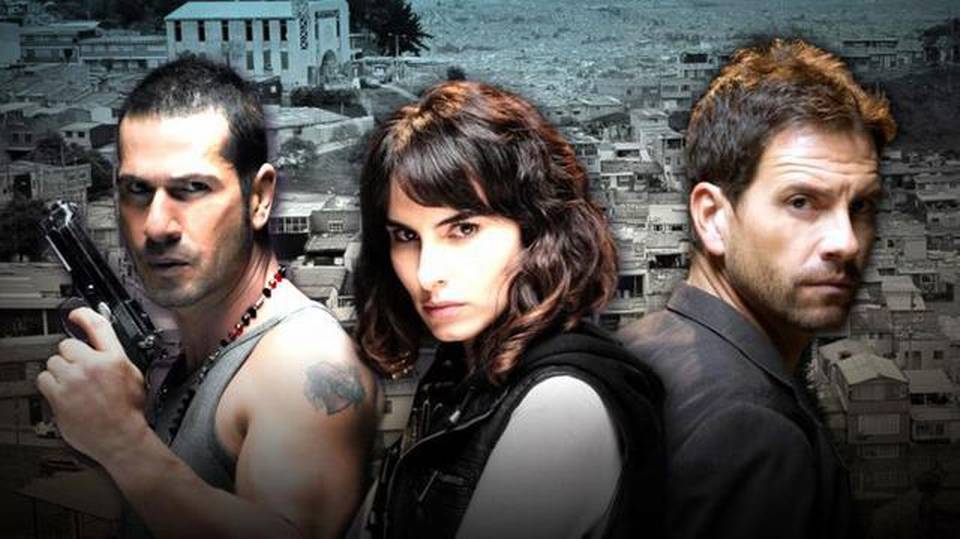
It’s a lot of threads to try and keep in the air, and I’m not sure it has been entirely successful thus far. It seems pretty clear where this is going to end up, with Ana and her boss having already shared their first, fleeting kiss. However, the second in command mentioned above, Yago, has the kind of smouldering good looks you know they’re not going to waste on celibacy. So I strongly suspect we’re going to see, down the road, Ana having to make some kind of dramatic choice between the two men in her life, on opposing sides of the law. I may be beginning to get the hang of this whole telenovela thing…
There are some positives. The location work is good, and much like Rosario Tijeras, you get a clear sense of the class divide in Colombia between the haves and the have-nots. I’m also intrigued by Michelle (Estefania Piñeres), one of Velasco’s enforcers. I have to wonder whether she was named after Michelle Rodriguez, for she sports a similar sneer, chip on the shoulder and corn-row hair-style. Hopefully, her character won’t be disposed off too quickly; if they can also give Ana more of an active role, rather than her character just being a passive information gathering conduit back to her boss, there’s still potential. While Serradilla’s charisma is still undeniable, it needs to be more focused than it has been thus far.
Jhansi Ki Rani
This is not Hispanic, originating from India. But it deserves inclusion, since it shares many of the same attributes as its Central and South American cousins. Perhaps, in the spirit of spaghetti Westerns, we could call this a currynovela? Er, best let’s go with Bollynovela instead. In particular, it has a very similar structure – told in daily episodes over an extended period. The version on Netflix I’m reviewing here has 70 episodes, but Wikipedia tells me the series actually ran for 480, originally broadcast from August 2009 through June 2011.
The thing which stands out through the first dozen or so is: I can only apologize. That’s writing as a Brit, because based on their portrayal here, they were utter bastards to the local subjects. This takes place in the 1840’s, at the height of the British Raj, when the Empire was intent on squeezing every penny possible out of the locals, and treating them as fourth-rate citizens. Not standing for this is Manikarnika, who at the beginning is a 14-year-old girl, the daughter of a Brahmin scholar on the fringes of the local ruler’s palace. Manu, as she’s known, begins a one-girl guerilla campaign against the occupying forces, creating an alter-ego “Kranti Guru”, who becomes an Indian version of Robin Hood. Needless to say, this doesn’t go down well, either with the British or some factions of her own countrymen, including her own grandmother.
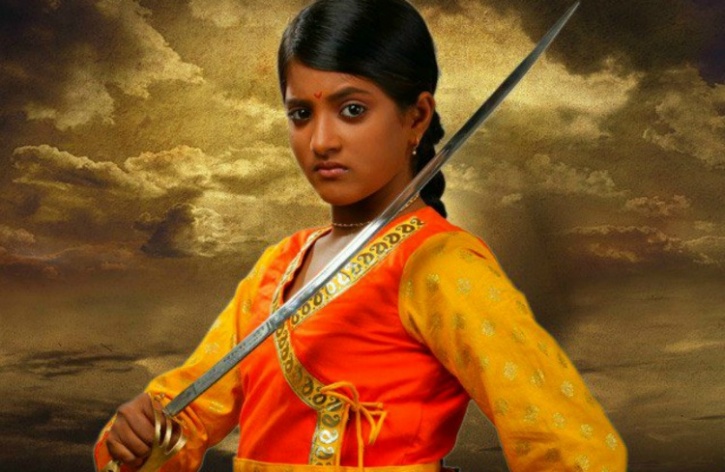
It’s based on the real-life story of Lakshmi Bai, who was indeed a rebel against the British in the mid-19th century. [The title translates as “Queen of Jhansi”] But there is so much other cultural stuff that must be taken as read. I can live with “It’s the worst of insults if a man’s turban touches the floor.” It’s what appears to be 12-year-old girls getting married off, which is a little difficult to wrap my brain around. The other weirdness is the directors’ fondness for reaction shots: lots of reaction shots. At one point, after some wedding gifts are returned (another massive social middle finger, it appears), you get 80 almost uninterrupted seconds of shocked faces. I know, because I timed it.
That said, I’m still quite enjoying this. It’s all remarkably lavish and brightly coloured, with intrigue at a Game of Thrones volume [albeit without the sex. Or the dragons], to the point I may not be entirely sure about who is disliking who or why. Manu makes for a spitfire-ish little heroine, and there are some surprisingly strong female characters. This includes one who is basically acting as a Bollywood version of Cersei Lannister [albeit without the incest], staging false flag attacks on the British and stabbing her… /checks notes brother-in-law? I think… Anyway, as one British officer puts it, if they don’t get these women under control, they could lose not just India, but England as well. Given current events in the latter involving Theresa May, that comment has acquired an almost spooky topicality.
 La querida del Centauro
La querida del Centauro
Yolanda (Ludwika Paleta, who was born in Poland, of all places!) has been sent to prison for involvement in a kidnapping case with her boyfriend. Proving herself a bit of a serial escaper, she is now dispatched to a higher-security facility, in which is also held notorious crime boss, Benedictino García (Humberto Zurita, who was also in La Reina del Sur), a.k.a. “El Centauro.” He takes a shine to Yolanda, though this doesn’t sit well with some of the other female inmates – nor El Centauro’s jealous wife. He hatches a plan to escape, and promises to take Yolanda with him. He gets out and she doesn’t, due to the unwitting intervention of Gerardo Duarte (Michel Brown), a cop trying to nail El Centauro’s. At the point of this review, Gerardo is using Yolanda’s love for her daughter as leverage, to get her to co-operate and act as bait for the boss.
I guess the major surprise was discovering that in Mexico, almost all prisons for women are mixed gender: according to one report, only thirteen of the 455 such jails are single-sex. This plays a very significant part of the plot here, bringing Yolanda to the attention of the man who had been her boyfriend’s boss – though neither of them knew each other prior to her incarceration. The series so far has been about evenly split between events in the prison, and on the outside. The latter has the heroine’s daughter, Cristina, being brought up by her mother who is… not a very nice person, shall we say. With a husband deep in debt, the mother sees Cristina – and in particular, her virginity – as a potential meal-ticket out of the barrio.
It has been a solid start so far, anchored nicely by Paleta’s performance as a woman who takes no shit from anyone, inside or outside prison. That becomes a bit of a double-edged sword with regard to Cristina, who represents Yolanda’s weakness. It was an ill-advised contact attempt with her daughter which got Yolanda captured and sent back to jail in the first episode. I suspect it’s also going to lead to her getting stuck between the authorities and El Centauro. And while it hasn’t materialized as yet – indeed, the lack of romance to date is very refreshing – I suspect Gerardo may end up becoming some kind of love-interest for her. He is married, but he has already discovered that his wife was cheating on him with a fellow cop.
At 51 episodes for the first season, it’s relatively short – the second has 90! – and I’m interested to see where this develops. After a fairly action-packed start, that aspect has become rather more subdued, though it’s largely down to the setting: with Yolanda being behind bars, and closely supervised from all sides, there’s not much she can do. It looks like Gerardo is brokering a deal which will get her out, in exchange for her working with him, and that may well open future possibilities, perhaps as an undercover operative.
 La Reina Del Sur
La Reina Del Sur
Based on a novel by Arturo Perez-Reverte, as noted above, this was the entry which truly kicked off the recent surge in the market. It’s the story of Teresa Mendoza (Kate del Castillo), whose boyfriend is “killed” by his drug-dealing cronies, which forces her on the run. She heads over to Spain, and begins work as a waitress at a brothel in the North African enclave of Melilla, after refusing a more “horizontal” position there, and begins to work her way up the crime ladder. However, her ambition brings her to the jealous attention of a workmate, who frames her for dealing drugs – to avoid deportation, she has to sleep with the brothel’s owner, although this also brings her into contact with the real power behind the local throne, Colonel Abdelkader Chaïb.
I like Teresa’s unwillingness to compromise her ideas: even though she’s on the run, she clearly has a goal, is intent on achieving it, and woe betide anyone who stands in her way. She’s also fiercely loyal to those who help her – and even has a sympathetic streak for her enemies (as we see when the woman who framed her falls afoul of her abusive boyfriend). It’s nice she also finds someone possessing similar moral scruples – smuggler Santiago Fisterra (Iván Sanchez), reluctant to transport cocaine or people, even though that’s where the big money is. Although nothing much has happened between then in the first 10 episodes, I’m predicting a relationship in their future. To be frank, I’m also predicting a return for her original boyfriend, because the way they filmed his death appeared deliberately vague i.e. no actual body was ever seen, to the point of obviousness.
Teresa has been relatively restrained in her actions so far, except for shooting one of her boyfriend’s former colleagues who tried (sigh… inevitably) to rape her. However, she has managed to disarm the jealous counterpart who came at her with a knife, and one senses more to come. I also like that much of this has taken place outside the standard settings of Mexico and Columbia, with the heroine now the one who is maligned for her otherness, and “talking funny”, even if Teresa plays up to the stereotypes as much as runs counter to them. When a friend needs help getting her son from Morocco into the enclave, Teresa basically points out that “us Mexicans are good at crossing borders”! Donald Trump would likely not disagree, but I suspect it’s likely for the best if we keep politics off the site.
Re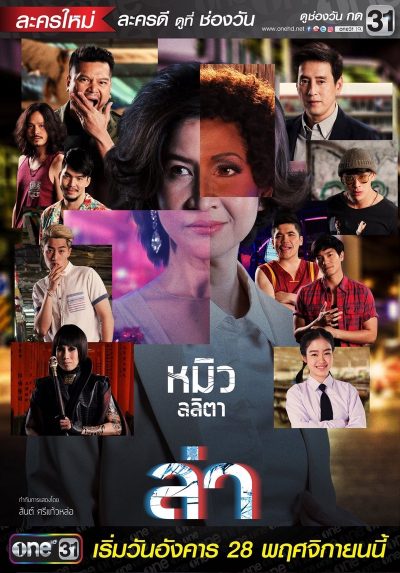 venge
venge
Another non-Hispanic entry, this one comes from Thailand. But it still shares enough of the common aspects to merit inclusion here. In particular, sexual assault as a plot device, and flashbacks. For the whole thing is told in hindsight, during the trial of Mathusorn for killing seven men. As we find out, they were the ones responsible for a night-long rape of her and her teenage daughter, which left the latter in a near-catatonic state. The law was unable to convinct most of those responsible, which left Mathusorn with no alternative but to see justice on her own terms. The original Thai title was Lah, which translates as ‘The Hunt’, and is perhaps rather more accurate than the fairly generic title Netflix has given it.
This is the first in the local genre of television known as “lakorns” which I’ve seen. Similarly to telenovelas, multiple episodes per week are aired, though their seasons appear to run significantly shorter. Revenge only has 24 episodes, though these do run longer, mostly being just shy of an hour in duration. This one does appear considerably grittier than most lakorns: according to Wikipedia, “The series’ main goal is to achieve a perfect ending where the lead characters marry their soulmates, and live happily ever after.” If that’s going to happen here, it’s going to require quite some spectacular writing, given the multiple murder charges for which the heroine is currently being tried.
It’s actually the third adaptation of the novel by Thai writer Thommayant, having previously been turned into TV series in 1994, as well as a 1977 feature. Obviously, I have no idea how those compare, but on its own merits, this has been solidly entertaining so far. Clearly, given the court setting, I have a fairly good idea of where this is going to go, but I’m still uncertain about the route by which it is going to get there. Panyopas Lalita is good as Mathusorn, though the character I’ve been most impressed by so far is Sensei Yuki, played by Rudklao Amratisha. She’s a Japanese woman who appears to run some kind of finishing school for wannabe vigilantes. I find your ideas intriguing and would like to subscribe to your newsletter.
I do have some slight qualms that the series is going to pull some kind of bait-and-switch, whereby we discover that Mathusorn isn’t actually killing anyone at all, and that it’s all in her head. She already does seem to have a split personality, and has conversations with herself which border on Peak Gollum. The cop who tried to put away the rapists might be a good candidate for the “true” murderer in those cases, and there have been some lines of his which make sense in that reading. While that might well lead towards the happy ending apparently required by the genre, it would be a bit of a shame as far as I’m concerned. If no review of the full series is ever forthcoming on this site, you’ll know why…
 Rosario Tijeras
Rosario Tijeras
The first one I tried, in part because the title was familiar from a film adaptation of the same novel, which I’d already seen. This one is a little older, dating back to 2010, and like the movie, is also from Colombia. The heroine, Rosario (María Fernanda Yépes), gets her nickname – Tijeras means “scissors” – after an incident at her Medellin school where she cuts off the hair of a teacher who is scolding her. That gets her expelled, but she also catches the attention of a visiting college student, Emilio, who spends many subsequent episodes trying unsuccessfully to track her down. Meanwhile, she also comes to the attention of an underworld boss with a thing for virgins, and he eventually provides Rosario with her first kill – a murder that is gratefully received by his rivals, and allows her to become a full-time assassin.
I’ve actually gone deeper into this one – 30 episodes to date, though that’s still well short of even half way – and it certainly does take its time to get going, with Emilio’s inability to locate her, in particular outstaying its welcome. Despite a tagline which proclaims “It’s harder to love than to kill.” there is clearly a great deal more of the former than the latter, and even though the men are generally more engaging and well-drawn than in some of the other series, that doesn’t stop them from behaving like stags during the breeding season. There’s also a big helping of class divide here, with the show depicting both the working-class lifestyle of Rosario and her family, which is in sharp contrast to the upper-class one enjoyed by Emilio and his chums.
If somewhat short on action thus far, it has still been entertaining viewing, not least by providing a door into a world that’s far removed from anything familiar to me. The split focus helps maintain freshness, and there’s greater depth given to the supporting cast than usual. The show came in for a lot of flak at the time of its broadcast in Colombia for glamorizing the drug traffickers lifestyle, with the main local newspaper sniffily calling the series a “gulp of absurdity, vulgarity, bad manners and a big dose of narco-culture.” Needless to say, that didn’t exactly stop the show from becoming a big ratings hit.
 Senora Acero
Senora Acero
Well, this one doesn’t hang around. Inside the first episode, we’ve seen a wedding turn into a blood-bath, as heroine Sara Aguilar (Blanca Soto) sees her marriage to a Tijuana police commander lead to her own kidnapping and near-rape, her father’s death, and not one but two assassination attempts on her husband – he survives the first, but not the second. Turns out he was actually in bed with the cartel, unknown to Sara, and during a drinking session, unwisely boasted about stealing $3 million from them. [Memo to self: not a good idea] They presume she knows where the money is, and she has to bail with her son for Guadalajara, while fending off others trying to figure out the stash’s location – not just the cartel, also the mayor of Tijuana, and even her own family members, who blame her for the misfortune which has befallen them.
However, despite some cool imagery – Sara riding through the forest on horseback in a tattered wedding-dress – this is likely the most “traditional” of the shows, and is probably the worse for it. There’s an excess of angst-filled family feudin’, and way too much in the way of medical misfortune as a plot device: inside the first 10 episodes covered here, we’ve already had multiple sclerosis, Type 1 diabetes, and a surprise pregnancy – that’s all discounting the plastic surgery disasters overseen by Enriqueta Sabido (Rebecca Jones), who uses cooking oil when there’s no silicone to be found. Unsurprisingly, this leads to a steady stream of dead bodies out the back door of her beauty salon. Frankly, she’s probably a bit more interesting and lively character than Sara, who has spent much of the time so far pouting ferociously and being concerned about her son’s health.
Maybe it’ll pick up down the road. For this was such a success it became one of the few telenovelas to be renewed, getting not just a second season, but a third due out at the end of this year. While not available yet on Netflix, the second series looks like it might be a bit of an improvement going by this promo pic. Absolutely nothing along those lines has yet to show up in the show thus far!
Undercover Law (La Ley Secreta)
Rather than first being broadcast on television in America, this series was picked up directly by Netflix from its producers, Colombian broadcasters Caracol Television. It’s also different in being much more of an ensemble piece. Most of these shows will concentrate on one central character, but here, there are four women, who so far have each received more or less equal screen time. It’ll be interesting to see if this egalitarian approach persists for the 60-episode duration of the show.
All four women are working for the Colombian authorities in different facets of the ongoing battle against the drug lords who control much of the country. The first we meet is Alejandra (Valeria Galvis), a drug courier arrested at the airport, who is “turned” by the authorities and released to act as a double-agent. There are also three more traditional undercover officers. Amelia (Juana del Rio) is out in the jungle, working as a cook at one of the camps where drugs are made and shipped. Sandra (Viña Machado) is in the white-collar end, trying to get close to the man involved in laundering the money. And Tatiana (Luna Baxter) is assigned the job of infiltrating the transport operations, led by ‘Capi’, the cartel’s chief pilot.

It’s somewhat soapy, by which I mean that all four women have problematic relationships, on which as much time is spent, as depicting their actual work for law-enforcement. Alejandra is seeking custody of her niece, due to her sister’s drug-addiction. Amelia’s mother has major health issues, and she’s still in the force only because they agreed to cover the costs of treatment. Sandra is a single mom, with a son whose an aspiring football star. And last, but not least, Tatiana just got married, with her husband less than impressed when she is literally called back from honeymoon to take part in the new mission. In her defense, this is a bit of an emergency, as the infamous drug lord “Lerner” – long presumed dead – appears suddenly to have come back from the dead, with a particularly potent new concoction, known as Yen.
In the early going, it’s mostly low-key clandestine work, as the four women seek to establish the bona fides and gain the trust of their respective targets. The most action-oriented to this point has been Amelia, who is very clearly at the sharp end of the business, living in the depths of the rain-forest, and teetering on the edge of her identity being revealed, when not trekking through the jungle. In contrast, Sandra has been set up in a lovely house, and gets to have dinner parties and drink wine as part of her cover. That’s the kind of “police work” for which I’d sign up… Not all the stories are equally interesting, and to be honest, most of the women come over as marginally whiny. However, the makers have done a good job so far of keeping these multiple balls in the air, avoiding the potential confusion resulting from a frequent switching of focus.

La Viuda Negra
This is, at least nominally, based on a true story, having been inspired by Griselda Blanco, a.k.a. “The Godmother,” who was one of the major players in the boom days of cocaine trafficking into Miami, in the seventies and eighties. Naturally, the actress who plays her here, Ana Serradilla, is considerably less homely than the real person – though since Catherine Zeta-Jones is playing Blanco in an upcoming Hollywood film, we can’t really mock the telenovela for prettifying the character.
In some ways, it certainly pays fast and loose with the truth. It begins with Blanco facing the death penalty in New York, and flashes back as she literally takes her seat in the electric chair. Never happened – indeed, no-one at all in New York state has been executed since 1963. But in other ways, it appears fairly accurate: her first serious criminal activity, kidnapping the son of a rich family for ransom, a crime which ended in her shooting the victim dead, did actually occur. Although she was actually younger in real life: eleven years old, which is likely more disturbing than anything scripted drama can offer.
The best thing about this is its relentless forward progress: going by the frantic early pace, there’s a lot to cover. In the first 10 episodes alone, Blanco goes to Medellin, joins a street gang, escalates to that kidnapping, and is then forced on the run by the victim’s rich parent who is obsessed with revenge. That leads to a lengthy hunt, as well as Blanco shooting her first husband for betraying her. She then heads to Ecuador, teams up with a local drug boss there, and returns to Medellin for revenge of her own, before setting up shop, and beginning her plan to import copious quantities of cocaine to the United States, hidden in high-heeled shoes. While I don’t know whether it can keep this going, so far, this has been among the most enjoyable of the series, and is probably the one I’m most interested in continuing.
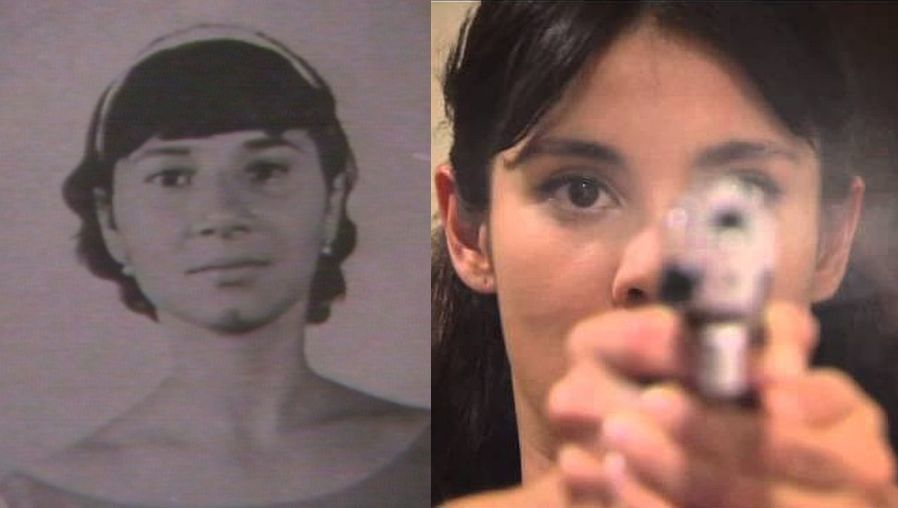 The young Griselda Blanco: real (left) and telenovela versions.
The young Griselda Blanco: real (left) and telenovela versions.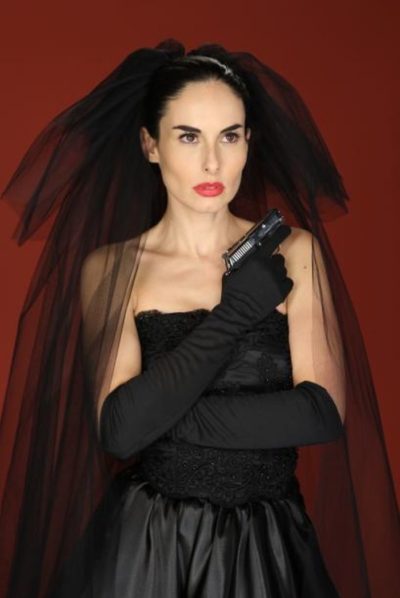 A focus of the early episodes sees Blanco joining a gang, which then kidnaps the scion of a rich local family. In the telenovela, this kick-starts her career, because the victim dies, and his father vows vengeance on Griselda, forcing her to go on the run as a young adult. The reality is perhaps even more astonishing, with her former lover, Charles Cosby, reporting that the kidnap and murder took place when Blanco was only eleven years old. After the boy’s parents refused to pay up, the frustrated gang gave her a revolver and challenged her to shoot him in the head. Challenge accepted…
A focus of the early episodes sees Blanco joining a gang, which then kidnaps the scion of a rich local family. In the telenovela, this kick-starts her career, because the victim dies, and his father vows vengeance on Griselda, forcing her to go on the run as a young adult. The reality is perhaps even more astonishing, with her former lover, Charles Cosby, reporting that the kidnap and murder took place when Blanco was only eleven years old. After the boy’s parents refused to pay up, the frustrated gang gave her a revolver and challenged her to shoot him in the head. Challenge accepted…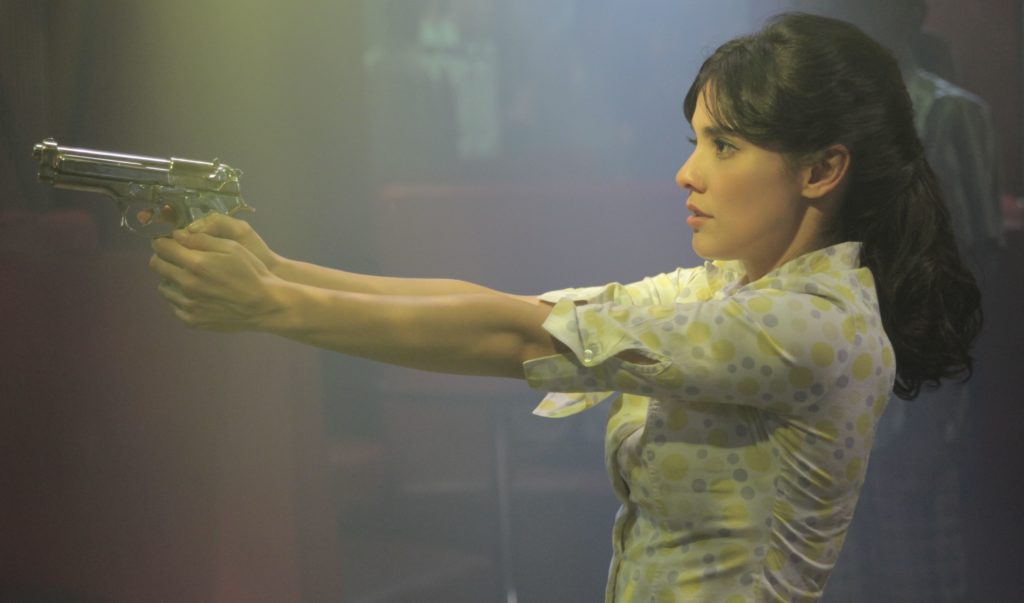 So, jail on both sides. But this is where the stories really start to diverge. In reality, she served 13 years in New York for cocaine smuggling, then was shipped to Florida where worse trouble awaited. For hitman ‘Rivi’ had turned stool-pigeon, and with his testimony linking her to literally dozens of murders, the death penalty loomed large. However, his testimony was largely discredited after a bizarre scandal in which he was shown to have paid secretaries at the Miami-Dade State Attorney’s Office for phone sex. In the end, prosecutors had to settle for lesser charges; Blanco got 20 years, and was released after only seven, returning to Colombia at the end of her sentence in 2004. The day she left, ‘Rivi’ was stabbed eight times in Dade County jail.
So, jail on both sides. But this is where the stories really start to diverge. In reality, she served 13 years in New York for cocaine smuggling, then was shipped to Florida where worse trouble awaited. For hitman ‘Rivi’ had turned stool-pigeon, and with his testimony linking her to literally dozens of murders, the death penalty loomed large. However, his testimony was largely discredited after a bizarre scandal in which he was shown to have paid secretaries at the Miami-Dade State Attorney’s Office for phone sex. In the end, prosecutors had to settle for lesser charges; Blanco got 20 years, and was released after only seven, returning to Colombia at the end of her sentence in 2004. The day she left, ‘Rivi’ was stabbed eight times in Dade County jail. Certainly, there’s major dramatic license in Blanco’s departure from prison. Rather than just reaching the end of her sentence, there’s a dramatic escape from literally being in the electric chair [which is odd, since no-one has been executed in New York state since 1963, and no woman since Martha Jule Beck in 1951]. Using a drug which gives the impression of death, allows her gang to break her out by ambulance (Episode 44). From there she returns to Colombia, and only at this point, does Blanco cross paths with the most notorious drug-lord of them all, Pablo Escovar. However, it appears they knew each other far longer. Some sources say they were childhood friends, others that he was Griselda’s “great apprentice,” and there are even salacious whispers they were lovers.
Certainly, there’s major dramatic license in Blanco’s departure from prison. Rather than just reaching the end of her sentence, there’s a dramatic escape from literally being in the electric chair [which is odd, since no-one has been executed in New York state since 1963, and no woman since Martha Jule Beck in 1951]. Using a drug which gives the impression of death, allows her gang to break her out by ambulance (Episode 44). From there she returns to Colombia, and only at this point, does Blanco cross paths with the most notorious drug-lord of them all, Pablo Escovar. However, it appears they knew each other far longer. Some sources say they were childhood friends, others that he was Griselda’s “great apprentice,” and there are even salacious whispers they were lovers.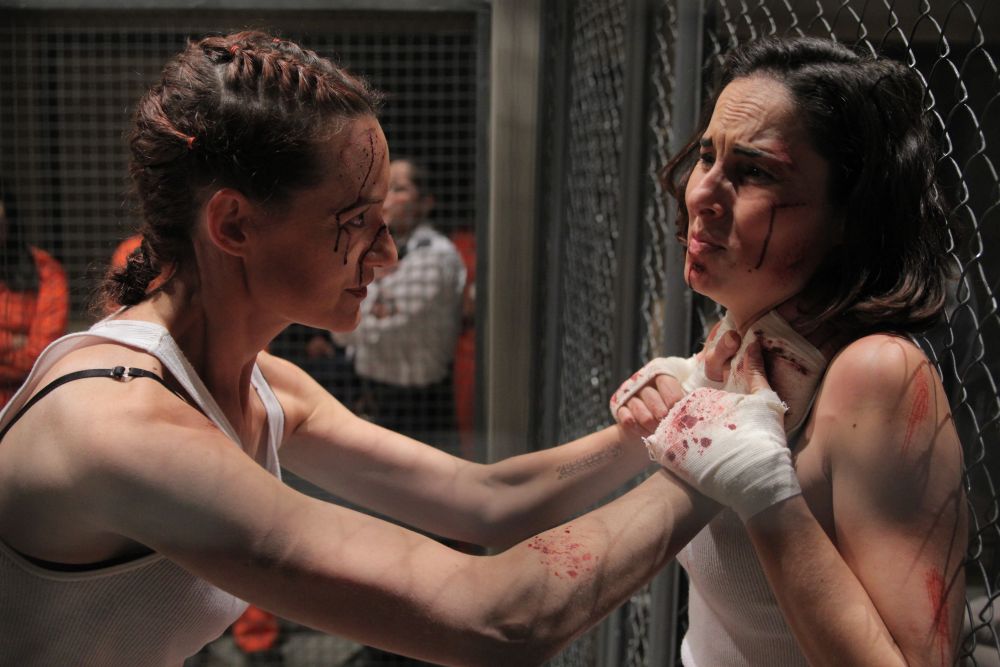 But it’s at the end the story diverts furthest from reality. Instead of having Griselda gunned down in the street by an unknown adversary, she and her longest lasting and most faithful ally, Richi (Román), are trapped in a cold-storage room. Rather than surrender, or be captured by their enemies, legal or otherwise, they agree to a mutual suicide pact. The screen goes black, we hear the sound of gunfire, and the series ends. But mere mortality is no match for the demands of audience ratings. And so, two years later, the show began its second season, with a further 63 episodes detailing the further adventures of Griselda Blanco. The fictional version of the character appears to be even harder to kill than her real-life inspiration.
But it’s at the end the story diverts furthest from reality. Instead of having Griselda gunned down in the street by an unknown adversary, she and her longest lasting and most faithful ally, Richi (Román), are trapped in a cold-storage room. Rather than surrender, or be captured by their enemies, legal or otherwise, they agree to a mutual suicide pact. The screen goes black, we hear the sound of gunfire, and the series ends. But mere mortality is no match for the demands of audience ratings. And so, two years later, the show began its second season, with a further 63 episodes detailing the further adventures of Griselda Blanco. The fictional version of the character appears to be even harder to kill than her real-life inspiration.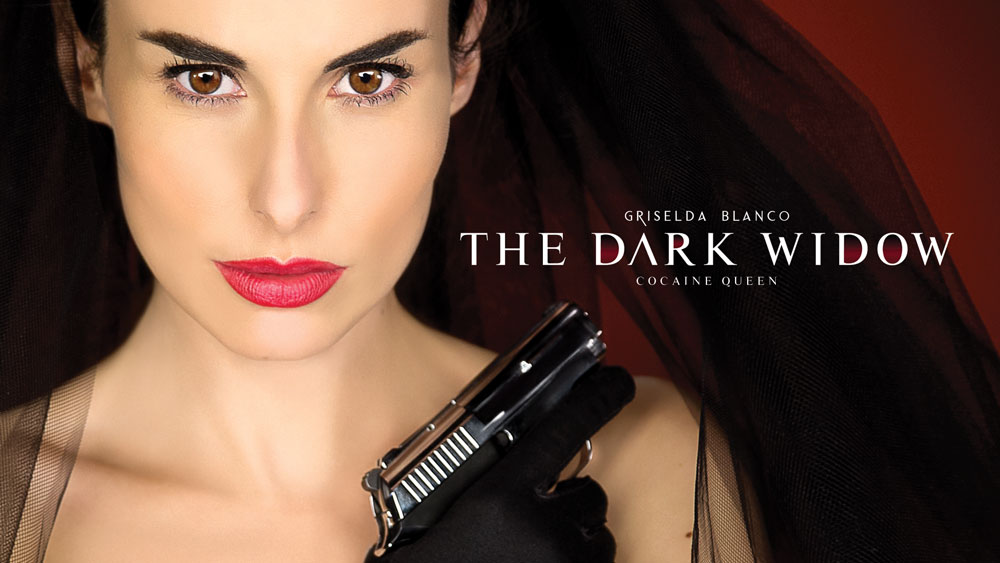






































 I’ll likely have less to say about the American version, because thus far, it has run barely 20% of the length of its predecessor, and tells far from a completed story. It is, however, radically different to this point in a number of ways. The most obvious is the shift in Teresa’s destination from Spain to the United States. This has caused some complaints among fans of the series and the novel, yet seems entirely understandable, given this is aimed squarely at the mainstream American market. While she’s still running from her boyfriend’s former employer, with a book containing a wealth of incriminating evidence, that information plays a more significant part here, becoming the McGuffin which drives the final third of the first season.
I’ll likely have less to say about the American version, because thus far, it has run barely 20% of the length of its predecessor, and tells far from a completed story. It is, however, radically different to this point in a number of ways. The most obvious is the shift in Teresa’s destination from Spain to the United States. This has caused some complaints among fans of the series and the novel, yet seems entirely understandable, given this is aimed squarely at the mainstream American market. While she’s still running from her boyfriend’s former employer, with a book containing a wealth of incriminating evidence, that information plays a more significant part here, becoming the McGuffin which drives the final third of the first season. The other major difference is one of focus. Teresa (Braga) has, to this point, not risen very high at all up the ladder of the drug business. There’s some obvious foreshadowing that she will, in that her “spirit animal” is an impeccably-dressed version of herself. But that appears well off into the future. For now, the real “Queen of the South” so far is Camila Vargas (Falcon). She’s the separated wife of Epifanio Vargas (de Almeida), who runs the American side of the business. She seizes an opportunity presented by Epifanio’s political campaign, and is working on going into business entirely on her own, dealing directly with the Colombian cartels. Needless to say, this does not sit well with her former husband, and when she discovers he is also after Teresa – no more than a low-level runner in her Dallas, Texas organization – her interest is inevitably piqued.
The other major difference is one of focus. Teresa (Braga) has, to this point, not risen very high at all up the ladder of the drug business. There’s some obvious foreshadowing that she will, in that her “spirit animal” is an impeccably-dressed version of herself. But that appears well off into the future. For now, the real “Queen of the South” so far is Camila Vargas (Falcon). She’s the separated wife of Epifanio Vargas (de Almeida), who runs the American side of the business. She seizes an opportunity presented by Epifanio’s political campaign, and is working on going into business entirely on her own, dealing directly with the Colombian cartels. Needless to say, this does not sit well with her former husband, and when she discovers he is also after Teresa – no more than a low-level runner in her Dallas, Texas organization – her interest is inevitably piqued.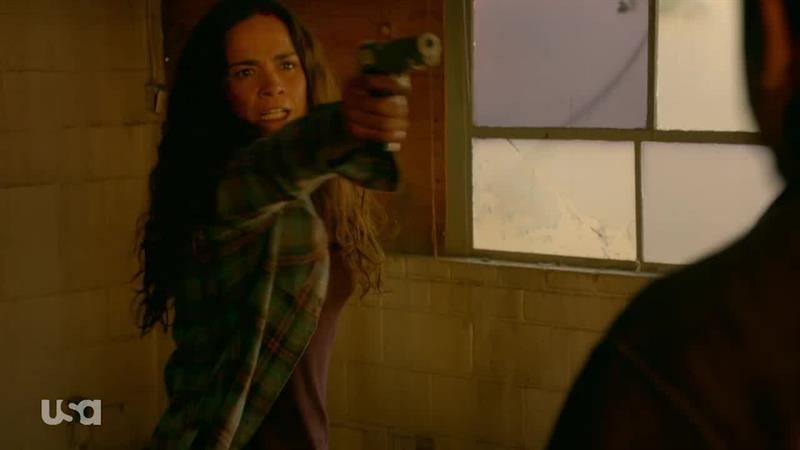





















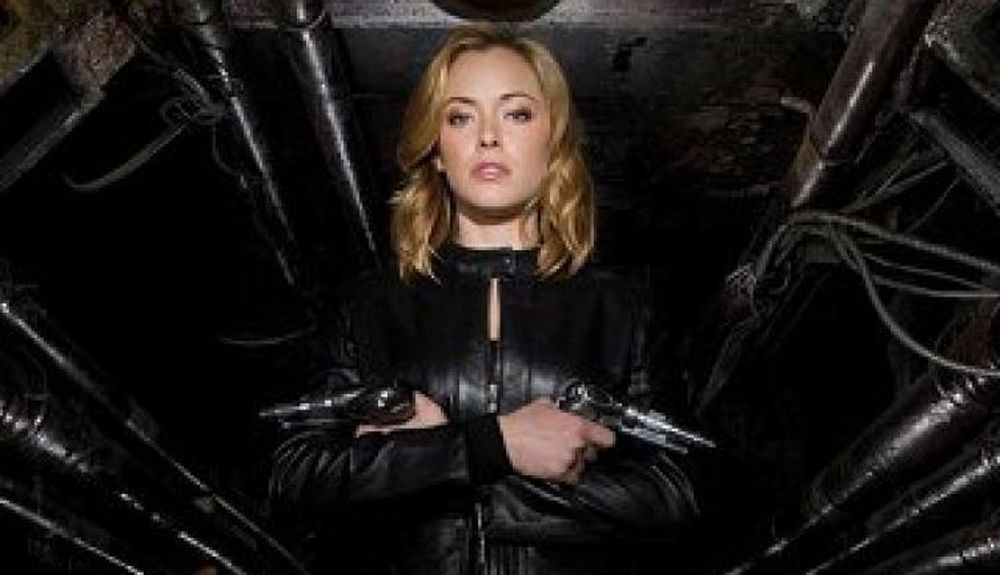




 For the new ground it broke, in its depiction of a heroine who could be as tough and ruthless as any man, clearly resonated with the audience. Inevitably, the show spawned a slew of others seeking to imitate its success, with similarly single-minded and ambitious heroines, prepared to gun down anyone who wrongs them, or gets in their way. And it’s this new generation of telenovelas, that we find showing up on Netflix in bulk. But where to start? That’s what this article is for: I’ve watched the series of potential interest to gauge whether they deliver on the potential offered by their covers. Though I give you a caveat. These shows typically run anywhere up to 80 episodes, and watching that would be about three months of the viewing time I devote to this site. So, I’ve based what follows, mostly on the first 10 episodes of each. Full reviews will follow eventually.
For the new ground it broke, in its depiction of a heroine who could be as tough and ruthless as any man, clearly resonated with the audience. Inevitably, the show spawned a slew of others seeking to imitate its success, with similarly single-minded and ambitious heroines, prepared to gun down anyone who wrongs them, or gets in their way. And it’s this new generation of telenovelas, that we find showing up on Netflix in bulk. But where to start? That’s what this article is for: I’ve watched the series of potential interest to gauge whether they deliver on the potential offered by their covers. Though I give you a caveat. These shows typically run anywhere up to 80 episodes, and watching that would be about three months of the viewing time I devote to this site. So, I’ve based what follows, mostly on the first 10 episodes of each. Full reviews will follow eventually. If perhaps the least “action heroine-y” of the shows taste-tested here, there’s a fair case to be argued for the storyline being the most interesting, overall. The show was inspired by Contrabando y Traición (Smuggling and Betrayal), one of the first “narcocorrido” songs from legendary norteño band, Los Tigres Del Norte. It tells of Emilio and Camelia who smuggle drugs into America, only for him to dump her. Camelia does not respond well: she shoots him seven times and vanishes with the money. It led to a movie of the same name, and has since become embedded in popular Hispanic culture, even
If perhaps the least “action heroine-y” of the shows taste-tested here, there’s a fair case to be argued for the storyline being the most interesting, overall. The show was inspired by Contrabando y Traición (Smuggling and Betrayal), one of the first “narcocorrido” songs from legendary norteño band, Los Tigres Del Norte. It tells of Emilio and Camelia who smuggle drugs into America, only for him to dump her. Camelia does not respond well: she shoots him seven times and vanishes with the money. It led to a movie of the same name, and has since become embedded in popular Hispanic culture, even  After the success of La Reina Del Sur, its star, Kate Del Castillo, went back to the narconovela well for this series, which takes place in Miami during the seventies. At this point, marijuana was the main drug of choice, but cocaine was on the rise, and the resulting battles for turf in Florida were bloody. The Cubans, Mexicans and Colombians fought each other, and among themselves, for control of the lucrative market. Arriving in Miami is the recently widowed Anastasia Cardona (Del Castillo), whose late husband was a major player in Mexico, with aspirations to become one of the “Owners of paradise”, as the title translates, in the American market.
After the success of La Reina Del Sur, its star, Kate Del Castillo, went back to the narconovela well for this series, which takes place in Miami during the seventies. At this point, marijuana was the main drug of choice, but cocaine was on the rise, and the resulting battles for turf in Florida were bloody. The Cubans, Mexicans and Colombians fought each other, and among themselves, for control of the lucrative market. Arriving in Miami is the recently widowed Anastasia Cardona (Del Castillo), whose late husband was a major player in Mexico, with aspirations to become one of the “Owners of paradise”, as the title translates, in the American market.

 La querida del Centauro
La querida del Centauro
 venge
venge


